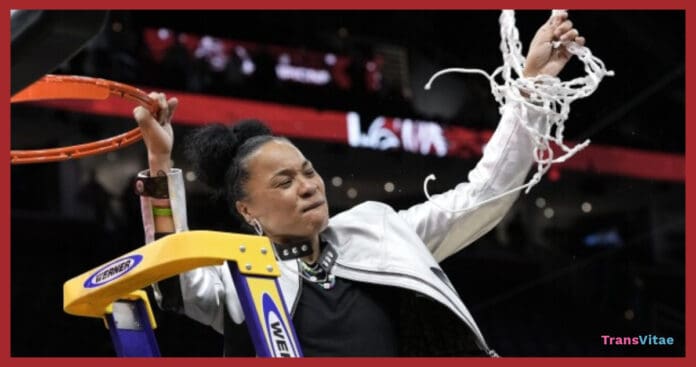In recent remarks that have sparked significant discussion and reflection within the sports community and beyond, South Carolina women’s basketball coach Dawn Staley expressed her support for transgender athletes competing in women’s sports. Her statement, delivered amid the backdrop of her team’s triumph over NC State in the Final Four, highlights a pivotal moment in the ongoing debate over transgender inclusion in athletics. Staley’s unequivocal stance, “If you consider yourself a woman and you want to play sports, or vice versa, you should be able to play,” serves as a powerful affirmation of transgender athletes’ rights at a time when the issue remains contentious across various spheres.
Legislative initiatives, policy changes, and public discussions have all increased in recent years, reflecting the discourse surrounding transgender athletes and their eligibility to participate in sports that reflect their gender identity. This conversation is not isolated to locker rooms or sports arenas; it has unfolded in statehouses, courtrooms, and the global court of public opinion, illustrating the deeply entrenched positions that characterize this issue.
The NCAA’s evolving policies on transgender athlete participation reflect an attempt to navigate this complex landscape. Initially adopting a comprehensive policy in 2010, the NCAA has sought to balance inclusivity with fairness in competition, leading to a 2022 amendment that allows sport-specific regulations. This shift came in the wake of the controversy surrounding Lia Thomas, a transgender woman and swimmer at the University of Pennsylvania, whose achievements in women’s swimming ignited widespread debate. The NCAA’s current guidelines, which require transgender women to meet specific testosterone thresholds for eligibility, embody the organization’s effort to establish a criterion-based approach to participation.
However, the regulatory environment at the state level presents a contrasting narrative, with 24 states, including South Carolina and Iowa, enacting legislation that imposes restrictions on transgender athletes. These laws, ostensibly aimed at ensuring competitive fairness, have catalyzed a broader examination of how such measures intersect with the principles of equality and nondiscrimination. The legal challenges to the NCAA’s policy, spearheaded by individuals like former Kentucky swimmer Riley Gaines, further underscore the contentious nature of this issue, raising critical questions about the application of Title IX and the rights of cisgender and transgender athletes alike.
International sports federations have also grappled with this issue, with several adopting more restrictive policies regarding transgender women’s participation. These developments signal a growing trend towards tighter eligibility criteria, grounded in concerns about physiological advantages and the integrity of women’s sports. Yet, they also highlight the ongoing struggle to reconcile the imperatives of inclusivity and fairness in a world that is increasingly recognizing the rights and identities of transgender individuals.
Dawn Staley’s comments, therefore, resonate beyond the realm of college basketball. They reflect a broader dialogue about identity, belonging, and the role of sports in advancing social inclusion. By voicing her support for transgender athletes, Staley not only champions their right to compete but also challenges us to consider the values that underpin our sports institutions and societies at large.
As this debate continues to unfold, it invites us to engage in a nuanced and empathetic examination of what it means to be inclusive in sports. It compels us to confront the complexities of identity and competition, urging us to seek solutions that honor the dignity and rights of all athletes. In doing so, it reminds us that at the heart of sports lies the potential to bring us together, transcending divisions and celebrating our shared humanity.
In navigating these challenging waters, the perspectives of figures like Dawn Staley are invaluable. They encourage us to imagine a world of sports that truly embraces diversity, where every athlete, regardless of gender identity, has the opportunity to pursue excellence on the field of play. As we move forward, let us carry with us the spirit of inclusivity and respect that Staley’s words inspire, working tirelessly to ensure that sports remain a beacon of unity and equality.


